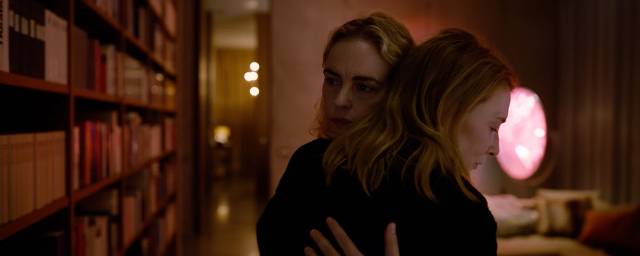Why is the main character of Tár a woman and not a man? Todd Field explains to our microphone.
Tár has been playing in France since Wednesday. Nominated 6 times for the Oscars, acclaimed by critics, the new film by director Todd Field seduces by the richness and complexity of its subject, and for its main interpreter, Cate Blanchett.
The actress, who has already received two Oscars (for Aviator and Blue Jasmine) plays Lydia Tár, a conductor, at the height of her art and her career. The launch of her book is approaching and she is preparing a concerto of the famous Symphony No. 5 by Gustav Mahler. But, in the space of a few weeks, his life will fall apart in a singularly current way. From this emerges a virulent examination of the mechanisms of power, their impact and their persistence in our society.
If this is not the main subject of the film, as the team tells us on our microphone, the current topics of #MeToo and Cancel Culture are one of the important springs of the plot. As Cate Blanchett sums it up, the film is “a study of power“.
AlloCine Todd Field at the microphone of AlloCiné
Some wonder, therefore, about the gender of the main character of the film, and even his sexuality. Why did you put a woman and not a man in the foreground to deal with the subject of the abuse of power? We asked its screenwriter and director if he had considered the question of the main role being held by a man?
He immediately replies that this has not been considered. “I believe that we all already know what we think about this subject, and that unfortunately men seem to have cornered the market on the issue of abuse of power and scandals. Men have held power for years and years. We are all too familiar with patriarchal power. We are tired of hearing about it and would like that to change.
Take some distance
And because of that, if you really want to have a story in which you observe power: how power corrupts, and how complicit people who hold power are, because they don’t hold it alone, but with d others, who allow this… If you want to observe all this, you have to take a little distance with what we read today. So it was very important that it was a woman.“
In a BBC interview (via variety), Cate Blanchett emphasizes the importance of not putting a man at the heart of the plot. “I don’t think you can talk about the corrupting nature of power in such a nuanced way as Todd Field has with a man at its center, because we understand so much what that looks like. I think power is a corrupting force, regardless of gender. It affects us all“.
In summary, the idea was therefore to look at the mechanisms of power, beyond gender, and take another look at this question.

2022 Focus Features, LLC
Cate Blanchett hugs Nina Hoss
The other motivation for this choice seems to be its interpreter: Todd Field wrote the film specifically for Cate Blanchett, and says he could not have considered the film without her. When asked about the actress with whom he was filming for the first time, Todd Field was full of praise: “Where to starthe smiles at our microphone. What to say about her that hasn’t already been said by othershe continues. It was a great opportunity to be able to dialogue with her, to collaborate with an artist like her. It’s something I’ll never forget“.
The actress, who is one of the favorites to win a third Oscar, brings a lot of nuance, complexity and subtlety to this role. We know her in a relationship with the character of Nina Hoss in the film, without the question of her sexuality becoming a subject.
Cate Blanchett had previously played a lesbian in Todd Haynes’ film Carol (which also earned her an Oscar nomination), but in that particular film, her sexuality figured prominently in the plot, her romance with Rooney Mara , breaking the conventions of the time.
Tár, starring Cate Blanchett, Nina Hoss, Noémie Merlant, Mark Strong and Sophie Kauer, is currently playing in France.
